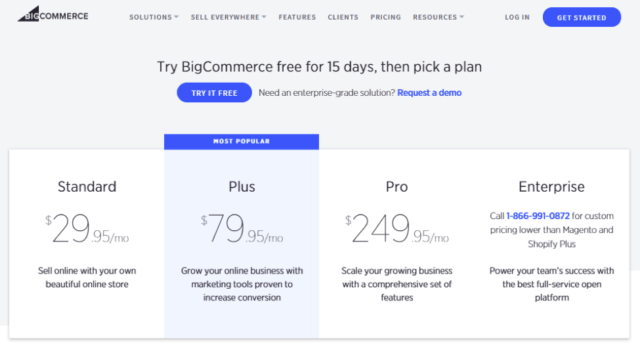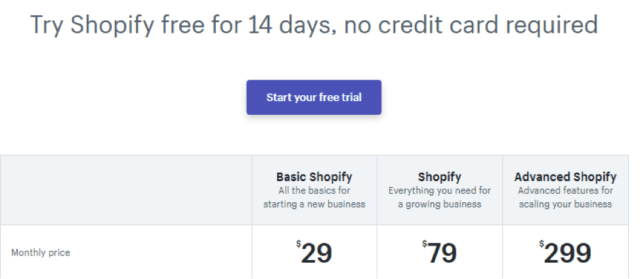You’ve finally decided it’s time to launch an online version of your brick-and-mortar store. Now, you’re faced with one of the most difficult decisions you will make as an online business owner – choosing an eCommerce platform to power your site. Ask any eCommerce expert this question, and they will tell you an unsatisfying answer; it depends. There are many factors to take into consideration, and unfortunately, there is no one-size-fits-all platform.
With so many eCommerce platforms to choose from, how do you know which is best suited for your needs? Sit back, take a deep breath and let’s dive into what you should know about the top eCommerce platforms that can power your site for long-term success.
Questions to Ask Before Choosing an eCommerce Platform
Before we discuss the most popular eCommerce platforms, there are three big questions you should ask yourself:
- How big is my budget?
- How much time do I want to spend creating and managing my online store?
- What marketing strategies do I want to use?
Of course, there are hundreds of factors to consider when choosing an eCommerce shopping cart, some of which we will cover in this post. However, these three questions will likely have the biggest influence on your final decision.
Budget
For online merchants working with smaller budgets, every dollar counts. Each eCommerce platform has different pricing plans that can help or hurt your bottom line.
Additionally, be sure to factor in the expense of any additional apps and plug-ins you may need and the cost of hosting if you decide to do it yourself (more on this later).
Time
Time is money. An eCommerce platform may be free or inexpensive, but how much time does it take to get your online store set up properly? More importantly, how much effort will it require to simply keep it running every day?
Your time is valuable. Low-cost eCommerce platforms are attractive, but many merchants find that purchasing a shopping cart that has everything they need is easier and less expensive when they factor in their time investment.
Marketing Strategies
What are your current marketing strategies? How do you plan to drive traffic to your online store?
These two questions are critical when choosing an eCommerce platform. If you rely heavily on your store’s blog to drive traffic, then a platform that has extensive search engine optimization (SEO) functionalities is preferred. Similarly, if you drive traffic through social advertising or pay-per-click (PPC), then do some research into how each platform supports these channels.
Hosted Versus Self-Hosted eCommerce
If you don’t know the difference between hosted and self-hosted eCommerce, we’ll shed some light on the distinctions of either solution. These options can also play a significant role in your decision because they can impact your budget and time.
With a hosted eCommerce platform, the company provides the software and the server to you. Essentially, you are given everything you need to run your online store. This is generally referred to as SaaS (software as a service).
Although this sounds ideal, it can limit what you do with your online store. A small business selling t-shirts may not mind this limitation, but other online industries may need greater flexibility if they want to grow.
That leads us to self-hosted eCommerce platforms. With a self-hosted platform, you pay a company to host your site, but you download and run the software. Those who choose self-hosted platforms must possess technical skills themselves or hire developers to implement things on the backend.
Self-hosted eCommerce platforms sound like a hassle, but the superior customization, flexibility and security are extremely appealing to growing online stores.
The Big Four eCommerce Platforms — Strengths and Challenges
Now, let’s discuss the key differences between the top eCommerce platforms. Although there are thousands of eCommerce platforms on the market, most online merchants use BigCommerce, Shopify, Magento or WooCommerce because of the vast amount resources provided by each platform.
Still, choosing between them can be overwhelming. Each platform is unique, and no solution is perfect for every online merchant. To help guide you towards an informed decision, here is a breakdown of each platform’s strengths and weaknesses.
BigCommerce
Founded in 2009, BigCommerce is a hosted eCommerce solution that currently ranks as the industry’s leading cloud eCommerce platform for mid-market businesses. It’s an impressive option, but is it right for you?
The Strengths: BigCommerce has notable out-of-the-box features that make it ideal for those without technical knowledge or coding skills, although you can tweak the CSS and HTML if you like. Features such as built-in SEO options, automated email functionality, discount coupons and a full content management system (CMS) are all included in their platform, which means that you can spend less on costly add-ons and potentially get more bang for your buck.
Plus, the company is dedicated to helping their customers run a successful online business. They provide tons of guides, how-to videos and relevant content to help even the smallest eCommerce business thrive in the marketplace.
Their pricing plan starts at $29.95/month, with no transaction fees. However, the basic plan limits how much you can sell and requires you to upgrade your plan if you exceed a certain sales threshold. This may not be an issue for smaller businesses.
Another thing to note is that BigCommerce’s abandoned shopping cart feature isn’t included in the standard plan. However, you can overcome this issue by simply downloading the Springbot app, which will provide you with robust, automated marketing tools, all on a single dashboard.
Do keep in mind that their out-of-the-box features are slightly advanced. As a result, business owners with more technical skill may prefer BigCommerce.
Shopify
Founded in 2006, Shopify has become one of the fastest growing eCommerce platforms, recently breaking the 500,000 mark for merchants using their services. What has attracted so many merchants to Shopify’s platform?
For starters, it’s incredibly user-friendly and doesn’t require much effort to get your online store up and running with just a few clicks. This hosted eCommerce platform was designed for small- and medium-sized businesses, and it is a great all-in-one solution for merchants who want to quickly set up an online store without any technical skills.
Pricing plans start at $29/month for the basic package, which will offer enough options for most small business owners. Although Shopify comes with many great features including SEO options and easy product listing ad integration, merchants may find themselves needing costly add-ons as they grow. Additionally, Shopify has transaction fees, which can only be waived by using Shopify Payments.
Still, there are some major benefits to using Shopify, such as fast page load times, an impressive array of website themes (all of which are mobile responsive), a huge app store and better credit card rates to name just a few. If your marketing strategy relies heavily on paid traffic, their Product Listing Ads (PLA) features and ability to sell on Pinterest are distinct advantages as well.
For business owners who are not the most tech-savvy, Shopify offers a large community of developers and 24/7 customer support in case something goes wrong with your online store.
Magento
Unlike Shopify and BigCommerce, Magento is self-hosted. Founded in 2007, this powerful eCommerce platform is open-source, which means that its code is available to anyone and can be modified to meet your online store’s unique needs.
Due to its superior customization and flexibility, Magento is ideal for eCommerce sites that need vast room for growth. With its ability to scale, it’s no surprise that Magento fuels notable brands, such as Coca-Cola, Burger King and Warby Parker.
For smaller eCommerce stores, determining if Magento is the right fit depends on a few factors. One of the biggest challenges presented by Magento is that it requires in-depth coding knowledge and technical skills. If you don’t have the skills or resources available, then hiring a Magento developer is a must.
Another challenge is the cost of Magento. The cost of a Magento site will depend on your skill level and your eCommerce store, but getting set up can have steep upfront costs. After all, you aren’t getting the out-of-the-box features that come with hosted solutions such as Shopify or BigCommerce. That means that you need to pay for your hosting, design and development costs, extensions, themes, support and whichever version of Magento you choose.
This may sound alarming to the average merchant, but Magento is one of the leading eCommerce platforms in terms of growth potential and customization. You have total flexibility with your online store, which can greatly impact your success when it comes time to scale your business.
WooCommerce
Launched in 2011, WooCommerce is one of the most popular plugins for WordPress. This self-hosted eCommerce solution has a few notable qualities that make it attractive to online merchants.
First, it is free and open-source, which means that it has many themes and add-ons to help power your online store. Plus, a community of developers is constantly working on improving the platform.
Keep in mind that while WooCommerce is technically free, you will still need to purchase a domain name and your own web hosting solution. If you already have web hosting, then this platform can save you a lot of money — especially if you plan on running multiple stores.
The challenge of WooCommerce is that it takes more technical skills to get set up and requires a more hands-on approach to manage your online store. Knowledge of WordPress is a must unless you plan on hiring one of their developers.
With the right skills and ample time, you can create a beautiful, unique eCommerce store with this platform. Just know that if you want to get your store up and running quickly, WooCommerce may not be the best option for you.
Additional Factors to Consider
Time, money and marketing strategies are important factors to consider as you choose an eCommerce platform. However, they aren’t the only things to ponder to find the best fit for your business.
In-House Shopping Carts
Some business owners find that they need a custom shopping cart that is tailored specifically to the needs of their eCommerce store. If you sell products that require highly specific and unique purchasing processes, then this is an option worth exploring.
Building an in-house shopping cart can reduce your bounce rates by streamlining an otherwise complicated checkout process. Although it isn’t the easiest route, it can pay off in the long term. Platforms such as FoxyCart or SnipCart can help you build a customized shopping cart suited to your online store.
Industry
While it wouldn’t be wise to choose an eCommerce platform solely on one factor, it does help to know which platforms are best suited to your industry. The types of products that you sell may play a big role in determining which shopping carts are best for your eCommerce store.
For example, many online stores on Shopify sell clothing, furniture and books. On BigCommerce, health and beauty are popular categories, especially for makeup and cosmetic stores.
Talk with representatives of each platform and ask them which industries use their platform and why. Certain features that may not be highlighted on their website could prove to be a big advantage in your industry.
Ease of Migration
Maybe your current eCommerce platform doesn’t have the capabilities you need to grow. In this case, migrating your store is the answer. The hassle of migrating varies by store, but those with more data and customization should be prepared to spend a little more.
It may seem stressful at first, but it is often worth the effort. Just be sure to create a migration plan to move all your data safely and securely.
Payment Gateways
How will you take payment details from a customer? Which payment options will you give your customers the most flexibility? These questions are important to ask before you choose an eCommerce platform because the wrong payment gateway can kill your cash flow.
Check each eCommerce platform to see which payment gateways they support. Also, be aware that some eCommerce platforms charge fees for using third-party gateways.
Final Thoughts
Choosing an eCommerce solution isn’t an easy decision to make. If you’re going to lock yourself into an eCommerce platform, then you need to think long term.
Hopefully, this guide has given you some food for thought. Whether you are migrating from an existing eCommerce platform or planning to launch a new online store, we recommend that you take advantage of their free trial period to get a better understanding of the different features and functionality. If you are wavering between two platforms, this can tip the scale and help you make an informed decision.






